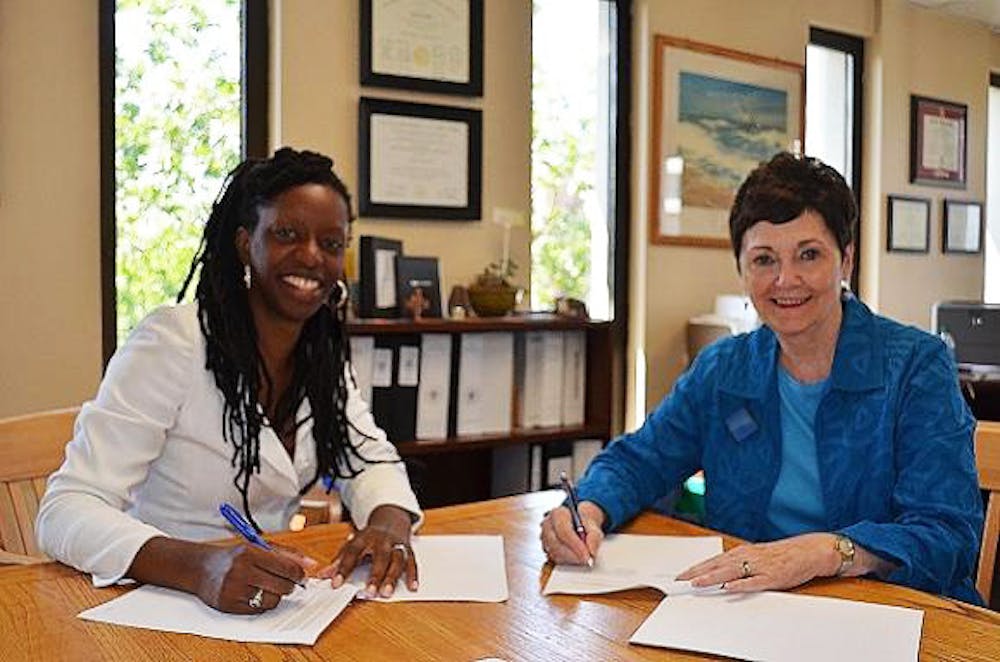Over the summer, the School of Public Health and the Rhode Island Department of Health established a formal academic partnership. Terrie Fox Wetle, dean of the School of Public Health, and Nicole Alexander-Scott MPH’11, director of RIDOH and assistant professor of health services, policy and practice, signed a memorandum of understanding recognizing the new relationship Aug. 15. The partnership will allow the two institutions to build on already existing projects and expand certain programs together, Wetle said.
“It’s a win-win situation to have the partnership,” Alexander-Scott said. “This … is part of what we at the RIDOH Academic Center are looking to emphasize in terms of integrating scholarly activities with public health practice.”
The RIDOH Academic Center was created under the direction of Alexander-Scott and facilitates programs such as the Public Health Education Academy. This program aims to “strengthen collaborations with academic institutions” and place public health students in programs to work with professionals in the field, according to the Department of Health website. Formally partnering with the School of Public Health, the only accredited public health program in the state, was a natural step for the center, Alexander-Scott said.
RIDOH and the School of Public Health have outlined several goals that they hope to achieve through the Public Health Academic Working Group, which the institutions will co-lead, she said. These goals include streamlining the process of placing public health students in health department projects, promoting collaboration between faculty members and RIDOH in both research and appointment to positions and creating a centralized system that will allow the institutions to share data.
The University has worked with the Department of Health for many years to ensure that collected data is made readily available for researchers, Wetle said. The Public Health Academic Working Group will work to identify data sources that might be available “internally but not externally” in order to make them more accessible, she added.
Ira Wilson, professor of health services, policy and practice, has been involved with the strategy and implementation of similar data-sharing agreements around the state. Wilson said that part of the significance of the memorandum of agreement between RIDOH and the School of Public Health is that the state recognizes the University as a private institution, but their shared goal of improving public health motivates them to improve data flow.
A specific project that Wetle said she would like to see is research on health equity zones. RIDOH has identified certain geographical areas in the state as health equity zones, which are “communities with disparities in health outcomes that need to be closed, whether it is food access, education gaps, environmental challenges, racial or ethnic concerns or behavioral health problems,” Alexander-Scott said. The agencies are coming together to develop specific standards and identify indicators of health equity, she added.
Alexander-Scott said she is also interested in partnering with the School of Public Health to combat health care-related infections and promote antimicrobial stewardship, a coordinated program that promotes the appropriate use of antimicrobials.
Public health encompasses a wide array of topics, ranging from prenatal care to smoking cessation to safe sex, Wetle said. With this new partnership, “we can develop short-term, long-term and mid-term partnerships to address these issues in a variety of ways,” she added.
Members of the faculty also see the benefits of the academic partnership.
Amy Nunn, associate professor of behavioral and social sciences, said she strongly supports the partnership because it combines the “best of research and the best of (programs)” and encourages collaboration on more projects. In the past, Nunn has worked with RIDOH to create an epidemiological profile on Hepatitis C.
“Brown students at all levels will have the ability to benefit from this,” Wilson said, describing the “bidirectional flow” of positive outcomes from the new partnership. Students will have more opportunities to participate in research, and the state department gains access to the “expertise, skills (and) enthusiasm” of the University, he said.
Though Wetle said she anticipates the administrative challenges that come with any partnership between a state department and a private university, she is committed to working through any issues and is excited to have Alexander-Scott as a collaborative partner.
With the University as a “foundational connection,” RIDOH hopes to eventually forge academic partnerships with a number of other universities in the state, including the University of Rhode Island, Rhode Island College and Johnson and Wales University, Alexander-Scott said.





